| |
|
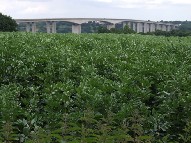 |
|
The parish of Wherstead
adjoins the borough of Ipswich on its
southern side, and Wherstead Road is
perhaps the grimmest of the main routes
into a town which does not always present
itself particularly elegantly to anyone
travelling into it. But Wherstead
churchyard is a remote, secretive place,
half a mile from the nearest road. It
used to be more remote: The track which
leads up to it has recently been blessed
with the pleasures of the Suffolk Food
Hall. In theory, it's a good idea -
expensive local produce is the very thing
to get the middle classes out of Tesco
and Sainsbury's. But I must say that I
baulk at shopping anywhere that describes
its stock as 'gourmet goodies'. Be
that as it may, you either linger or
scurry past the new neighbour, and carry
on up the track until you leave all the
noise and clamour behind you. At the top
of the hill sits St Mary in its
pleasingly rolling graveyard. From here
you have a view of one of East Anglia's
most famous landmarks, the Orwell Bridge,
which cuts the parish of Wherstead in
two. Behind you, hidden by rising ground,
is 19th century Wherstead Hall, once the
headquarters of Eastern Electricity, now
home to the privatised power company
currently calling itself E-on. Beyond
that, on the far side of the Manningtree
road, is television's "Jimmy's
Farm". But you would not know that
the modern world came anywhere near, to
stand here among the bird song and the
rustling of the bean fields.
|
Wherstead
has never been a big place. At the time of the
1851 census, when the population of many rural
East Anglian parishes reached their peak, there
were just 238 people living here. Despite the
proximity to Ipswich (the Cornhill in the centre
of town is barely two miles from this church) St
Mary is little-known. It is visible on its hill
top to a boat coming up the Orwell, which sprawls
dramatically in the valley below, but hidden from
the view of any road. The river leads the eye
south-eastwards to the cranes of Felixstowe and
Harwich. On the far bank, the brooding woods look
strangely foreign, as if we were in some kind of
outpost, and proper, wild Suffolk began over
there.
Until
the summer of 2008, I had never been inside this
church. Unusually for the Ipswich area, it is
kept locked, and I had never seen a keyholder
notice until a Sunday in June, when Martha and I
got out our bikes and went for a ride. Now, there
were three telephone numbers listed in the
lychgate. As I dialled one, it began to rain: but
it turned out that this was fortuitous, because
the churchwarden had been painting his garage,
and the rain meant he'd have to stop, and could
come over and open up.
St
Mary is pretty much an entirely Victorian church,
but one of particular interest. The architect was
Richard Phipson, who
restored the 15th Century tower and rebuilt the
nave and chancel, retaining the Norman south
doorway. Big lions along the roofline recall his
gargoyles at the town centre St Mary le Tower. Stepping
inside, the interior is almost entirely 19th
century, but of high quality, a testament to the
commitment and money of the Dashwood family of
Wherstead Hall. One possible medieval survival is
a composite figure of St Edmund in a window on
the north side, but it might be a Victorian
confection. The only later note is the lovely
1963 window depicting David the Shepherd and
David the King, by Dennis King.
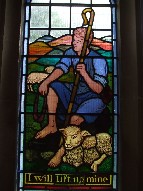 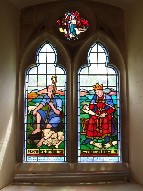 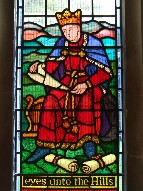
While
Phipson's work is found at nearly a hundred East
Anglian churches, Wherstead's interior is raised
above the mundane by two of the great craftsmen
of 19th century Ipswich. Henry Ringham was a
woodcarver working in east Ipswich (Ringham Road
off of Cauldwell Hall Road is named after him)
and this was his last major commission. He is
responsible for the woodwork, including the
benches and the roof. Another Ipswich craftsman,
the stone mason James Williams, created the font
with its elaborate carvings, including a terrific
St Michael. There is more of his excellent work
at Brome. The glass is also of the highest
quality, by important workshops: the Works of
Mercy in the west window are by William Holland,
while the two windows up in the sanctuary are
both signed by Alexander Gibbs. The pulpit,
carved by a Belgian workshop, is perhaps more of
an acquired taste.
| I had been worried by the
state of the church when we first
arrived: two windows were boarded up. It
turns out that this little church is a
regular prey to vandalism, and that is
why they keep it locked. Unfortunately,
of course, a culture of vandalism to a
building is a difficult thing to turn
around. Most East Anglian churches are
neither kept locked or vandalised.
Ecclesiastical Insurance asks parishes to
keep their churches open during the day,
because this dramatically reduces the
chances of vandalism. Most insurance
payouts are not for items stolen, but for
damage caused to doors and windows of
locked churches. It
is hard to suggest that Wherstead church
would benefit from being kept open when
it is already deeply enmeshed in a cycle
of damage, but you can't help thinking
that the fortress mentality of a handful
of Suffolk churches does them no good, as
well as little credit. Be that as it may,
this lovely little church deserves as
many visitors as it can get - why not a
welcoming sign down by the Suffolk Food
Hall, another up at Jimmy's Farm, and an
occasional open door for pilgrims and
strangers? It's worth a try.
|
|
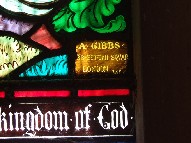 |
|
|
|

